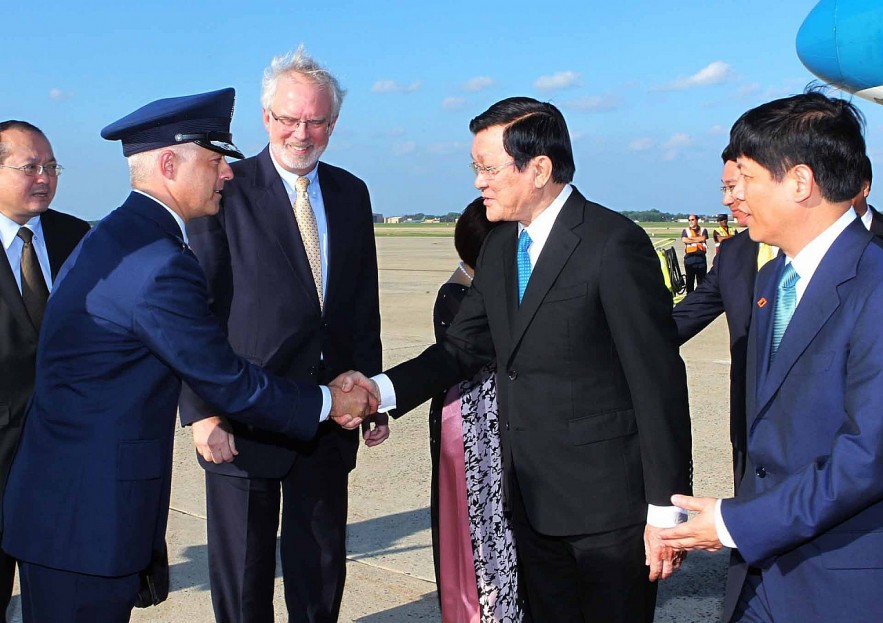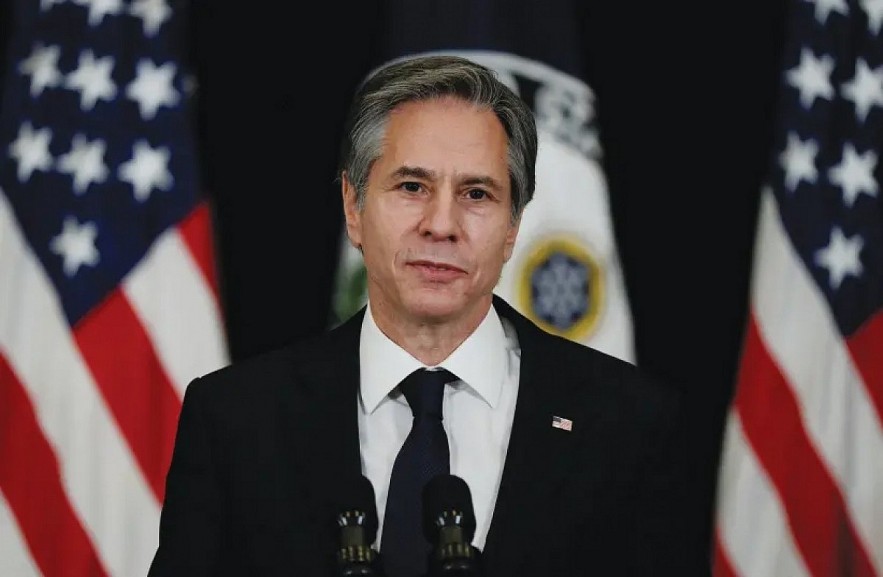 |
| Ambassador Nguyen Quoc Cuong (right) directly participated in the preparation for the official visit to the US by President Truong Tan Sang from July 23-26, 2013. |
The visit of US Secretary of State Antony Blinken to Vietnam, at the invitation of Minister Bui Thanh Son, is of great significance for the Vietnam-US relations. It is a clear demonstration of the commitment of both countries to strengthening ties and deepening their cooperation. The visit also presents an opportunity for both countries to discuss issues of mutual interest and to explore areas for possible collaboration. By discussing the current state of the relationship and potential areas for cooperation, the visit will help to create a strong foundation for future bilateral relations between the two countries.
US Secretary of State Antony Blinken’s visit to Vietnam from April 14-16 is an important milestone in the positive evolution of the relationship between Vietnam and the US in recent years, especially the maintenance of regular contact at a high level after a period of stagnation caused by the Covid-19 pandemic.
In May 2022, we were privileged to witness a successful visit to the United States by Prime Minister Pham Minh Chinh. During the ASEAN-US Special Summit, more than 60 bilateral and multilateral activities were undertaken. It was an event of great historical significance, one that will surely leave a lasting impression on the international community.
After that, the Prime Minister had the opportunity to meet and discuss with President Joe Biden at the 40th and 41st ASEAN Summits in Cambodia in November 2022. They discussed a range of issues, from strengthening regional cooperation to promoting economic integration. The Prime Minister also reiterated the importance of upholding the rule of law and international law, which is critical for maintaining peace and stability in the region.
The most recent high-level phone conversation between General Secretary Nguyen Phu Trong and President Joe Biden on March 29 had important and substantive contents. The two top leaders noted that the relationship between the two countries had been developing comprehensively and agreed to further deepen it in the years to come.
People paid close attention to the fact that General Secretary Nguyen Phu Trong and US President Joe Biden repeated their invitation to visit each other at a high level. Both leaders gladly accepted the invitation and assigned the relevant agencies to arrange at a suitable time.
US Secretary of State Blinken’s visit to Vietnam this weekend is an important milestone in the development of relations between the two countries over the years, as well as in maintaining regular high-level contacts. It is my sincere hope that this visit will bring about substantive results and concretize the exchanges and agreements at the highest level between the two countries.
 |
| US Secretary of State Antony Blinken visit Vietnam from April 14-16. Photo: Reuters |
The year 2023 marks a decade since the two countries established their Comprehensive Partnership. As an insider who was around for an important event between the two countries ten years ago, what do you most fondly remember and cherish?
I was honored to witness and directly participate in the preparation for the visit to the US by former President Truong Tan Sang to negotiate the Joint Declaration establishing the Comprehensive Partnership between Vietnam and the US in July 2013, when I was working as Vietnam Ambassador to the US.
The visit was carefully planned and executed by numerous ministries and branches of both countries over the course of many months. By the time the day of the visit finally rolled around, all of the hard work had paid off. The result was a successful and memorable visit that both countries will remember for years to come.
Now, however, their leaders have the foresight to recognize the importance of peace and work together for the benefit of both nations.
What I am most interested in is the foresight of the leaders of both countries. Having been former enemies, they experienced a fierce war that had severe consequences for both sides, especially in Vietnam. Now, however, their leaders have the foresight to understand the importance of peace and are working together to create a better future for both nations.
Overcoming those barriers and leaving the past behind to look towards a brighter future can be easier said than done. In both countries, there are many diverging opinions, which is to be expected. Everyone has the right to their own opinion and it is important to respect that. Despite the differences in opinion, it is possible to find common ground and work together to build a better future. By focusing on the things that unite us, rather than those that divide us, we can make a positive difference and create a more prosperous and peaceful future.
During the preparation for the visit, I openly discussed with my colleagues at the White House and the US State Department that, even among the leaders of Vietnam, there are individuals who have been arrested and cruelly tortured during the war, some of whom have tragically lost their loved ones, and some people still have fragments of American bombs and bullets embedded in their bodies. Nevertheless, despite all this, they now agree to upgrade relations with the US, which presents a great opportunity that should not be missed by either side.
Perhaps that is also one of the reasons that the United States agreed to recognize in the 2013 Joint Statement the principles of the Comprehensive Partnership, including the principle of respecting each other’s independence, sovereignty, territorial integrity, and political institutions. This is something that I am particularly interested in.
How do you feel about the new developments in both “quantity” and “quality” of Vietnam-US relations?
My assessment is that in the past ten years, the relationship between Vietnam and the US has been progressing rapidly and in a positive manner. In that time, both countries have made tremendous strides in strengthening their comprehensive partnership. The two countries have established closer ties in areas such as trade, defense, and cultural exchange, while also increasing cooperation at the regional and global level. This has enabled them to jointly tackle a wide range of challenges, from climate change to pandemics. As a result, the relationship between Vietnam and the US has become increasingly important and mutually beneficial.
Ten years ago, the leaders of the two countries identified nine key areas of cooperation in their Comprehensive Partnership:
- Political and diplomatic relations
- Trade and economic relations
- Science and technology
- Education and training
- Environment and health
- Settlement of war consequences
- National defense and security
- Protection and promotion of human rights
- Culture, sports, and tourism
Looking back, the relationship between the two countries in all nine areas has made good progress.
Economic and trade relations between the two countries have grown significantly, becoming a key pillar of the bilateral relationship. In 2022, two-way trade hit a record high of US$123 billion. For the first time, Vietnam’s exports to the US surpassed US$100 billion. Additionally, more than 30,000 Vietnamese students are currently studying in the US, making them the largest group of ASEAN students in the country.
I was impressed when General Secretary Nguyen Phu Trong suggested to President Joe Biden that the US continue to create favourable conditions to increase the number of Vietnamese students in the US, and welcome the development of Fulbright University Vietnam into a centre of high-quality training in the region.
Between the two countries, there are significant opportunities for cooperation in emerging fields such as response to climate change, post-pandemic economic recovery including supply chain assurance, logistics, cooperation in the digital economy, green transformation, and health.
Therefore, the potential for cooperation between the two countries on both bilateral and multilateral levels is immense.
You once shared that, with anything, it must happen in the right order, at the right time. Undoubtedly, the Vietnam-US relations have gone in the right order and developed according to their inherent nature. Now, what are your expectations for a “new landing” of bilateral relations? Will it bring about a new era of understanding and cooperation between the two nations? Or will it mark the start of a new chapter in the long-standing relationship? Only time will tell.
It is undeniable that the relationship between Vietnam and the United States is truly special. From being enemies during the Vietnam War, the two nations have now become comprehensive partners. The friendship between the two countries is a testament to the power of reconciliation and the potential of cooperation. Through the years, the two countries have worked together to develop economic and trade ties, as well as to promote peace and stability in the region. The United States is now one of the largest investors in Vietnam, with bilateral trade reaching over $55 billion in 2018. This partnership has helped both countries to build a prosperous future and to foster regional cooperation. With mutual respect and understanding, the Vietnam-US relationship will continue to grow in the years to come.
In the United States, the Vietnamese Embassy commemorated the twentieth anniversary of the normalization of trade relations between Vietnam and the US (1994-2014) with a grand celebration held in the large meeting room of the US Senate.
In the United States, the Vietnamese Embassy commemorated the twentieth anniversary of the normalization of trade relations between Vietnam and the US (1994-2014) with a grand celebration held in the large meeting room of the US Senate.
After the flag-raising ceremony and the singing of the national anthems of the two countries, Senator John McCain (1936-2018) remarked that it was nothing short of remarkable to witness the flag of Vietnam being raised in the US Senate. “If you live long enough, like me, you can see the impossible become possible,” he said.
Although there have been “spectacular” developments, as mentioned, there are still shortcomings that remain between the two countries.
Our two countries continue to discuss political differences, such as democracy and human rights, as well as economy, trade, investment, finance, and international and regional issues. Despite this, there remain doubts and barriers concerning their societies, particularly with regards to the aftermath of war.
That is the fact that both sides still need to make more efforts in order to move towards a better future and achieve a “new landing.”








